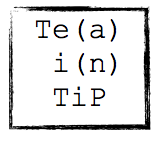TiP welcomed Anna Wallsten for 9 weeks this semester, and she took part in our informal interview series, this time with Marisa Cohn. 
Marisa: Tell us about your visit – where are you coming from and how long are you visiting us in Copenhagen?
Anna: I’ve been here for about 9 weeks. I’m from Linköping University, Tema technologies and social change, which is a department doing STS research. Which is why I’m here really, because of the STS research going on here.
Marisa: What questions problems or issues are you working on while you are at TiP?
Anna:Well, primarily I’ve been working on an article, but it has been partly to see a different department and a different way of organizing things. It is good to see that things can be done differently than at your home institution, to see a different research environment, but also to be part of different conversations. More specifically, I came to work on this article I’m writing [about smart grids] but I also came to see what YOU all are working on.
Marisa: Did being here give you a new perspective on the article?
Anna:I got a lot of good feedback and also a lot of understandings from talking to people about how to do STS in different ways. I got a lot of insight from attending the STS salon and the whole TiP day seminar was really great to get to talk to people. Especially getting to think from the perspective of what is your contribution as a researcher, how can you contribute and how should we contribute? How can you turn your multiple engagements into a contribution?
Marisa: Do you have a sense of that from the seminar, how you want to contribute through your research engagements?
Anna:Hmmm… I want to show the tensions that occur when things that are taken for granted are put into practice; that things can become so much more complex than one at first can expect and that there are a lot of values embedded in the imaginaries of the future energy system.
Marisa: How did you end up working on what you do? How did you get engaged in your case?
Anna:I had the chance to do whatever I wanted as long as it had to do with energy, that was the framing of my project at the start. And I’ve always been interested in the environmental transition and how there are multiple understandings of how it can be changed or what it is that is being changed. The whole discourse of what it is that we’re changing and how those different imaginaries clash. Then I found this case on Gotland that seemed interesting for how these imaginaries are put into practice. The whole smart grid fuzziness and that no one really knows what it is about and what happens when it hits material practice.
Marisa: What would you like to work on in the future/where do you see this work going?
Anna:Continue working on my dissertation, I have some time left for that, and interviewing more people who represent other alternatives.
Marisa: can you share with us a surprising moment from your fieldwork?
Anna:The whole fieldwork itself has been very surprising. The whole thing that I thought I would go there, interview people, go home and analyze. But I have come to realize that these are very smart individuals that struggle with these ideas of how to do this. That they can laugh at this just as much as I can.
Marisa: So how you gain sympathies for people you study?
Anna: Yes you do. After a while… you gain sympathy by gaining understanding for the complexities.
Marisa: What is the Coolest thing about your current research?
Anna: That it has to do with the future. Which is so many things. The imaginaries, the future, about a thing that it is something I really care about. I really care for the environmental issues of our time and that it is being transferred into something else. That’s not cool exactly but it…. is what is exciting about the project.
Marisa: What is your favourite tea/baked good/ danish food, I know that Sweden and Denmark have some rivalry about pastries…
Anna: Well I’ve only had lunches at the canteen! So I haven’t tried much. But I had those little brown breads they served there. Bread with nuts in them. Those are really good.
Marisa: They don’t have kannelbulle day here.
Anna: No but they have, smorredegsbrod, smorrebrod. How do you say it in Danish? I tried that and it is really good.
Marisa: What is the best thing about being at TiP
Anna: The best thing to be at TiP is that there are so many smart people working on interesting stuff here.
